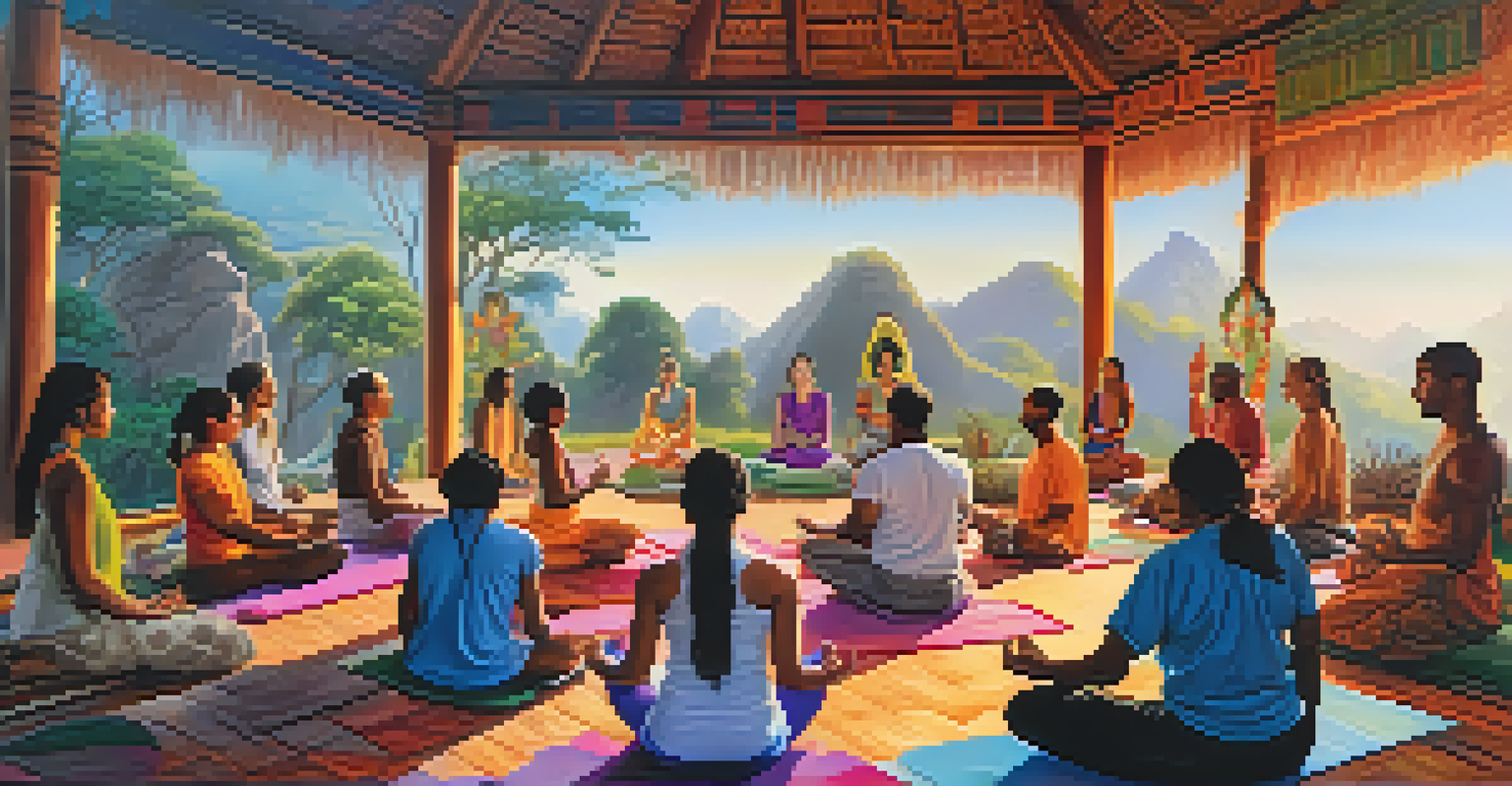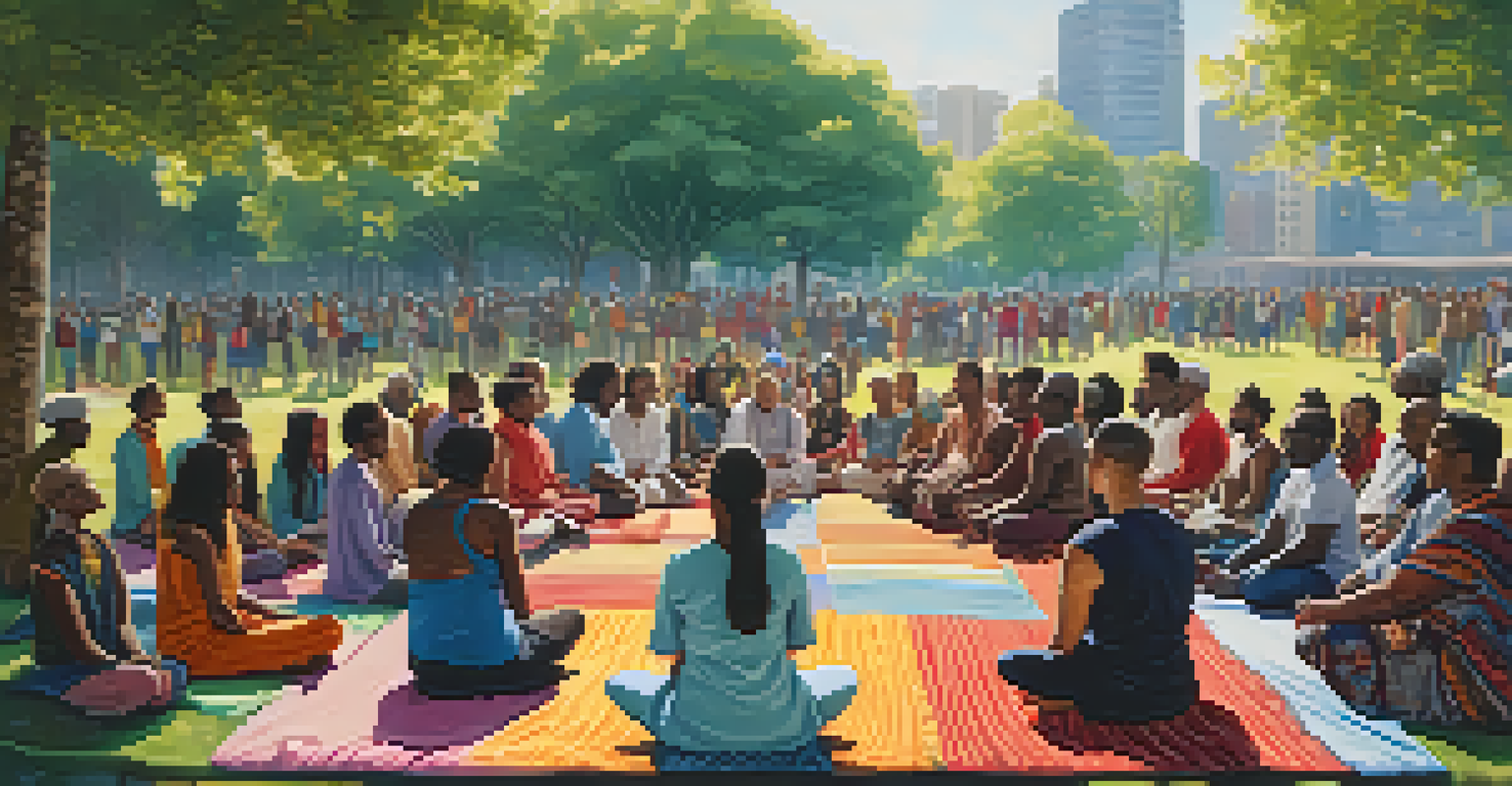The Intersection of Spirituality and Identity in Different Cultures

Understanding Spirituality: A Universal Concept
Spirituality can be thought of as a personal quest for meaning, purpose, and connection to something greater than oneself. It transcends organized religion and often includes individual beliefs and practices that guide a person's life. For many, spirituality offers a way to explore identity through introspection and self-discovery.
Spirituality is not about what you believe, but how you relate to the world.
In different cultures, spirituality manifests in varied forms, from meditation and yoga in Eastern traditions to the deep-rooted rituals in Indigenous practices. These diverse expressions create a rich tapestry of belief systems that individuals draw from to shape their identities. Understanding this broad spectrum allows for a more inclusive dialogue about spirituality across cultures.
Ultimately, spirituality serves as a lens through which individuals can view their lives and the world around them. It influences values, ethics, and even social interactions, making it a crucial element of one's identity. Embracing these differences fosters respect and appreciation for the myriad ways people connect with the spiritual realm.
Cultural Identity: The Role of Traditions and Beliefs
Cultural identity is often intertwined with spirituality, as traditions and beliefs are passed down through generations. These practices not only preserve history but also offer a sense of belonging and community. For instance, the rituals surrounding birth, marriage, and death in many cultures underscore the spiritual significance attached to these life events.

In many Indigenous cultures, spiritual beliefs are deeply embedded in the community's identity, often reflected in art, storytelling, and ceremonies. This connection to spirituality can provide individuals with a strong sense of purpose and belonging, reinforcing their cultural identity. It's a vibrant reminder that identity is often a collective experience shaped by shared beliefs and practices.
Spirituality Shapes Personal Identity
Spirituality serves as a lens through which individuals explore their identity and connect with something greater.
As globalization continues to blur cultural lines, the preservation of these traditions becomes increasingly important. Cultures that maintain their spiritual practices often find strength in their identity, enabling them to navigate the challenges of modern life while honoring their roots. This intersection of spirituality and cultural identity is a testament to the resilience of diverse communities around the world.
Spirituality in the Age of Globalization
Globalization has brought diverse cultures into closer contact, leading to a fascinating blend of spiritual beliefs and practices. As people travel and communicate across borders, they often encounter new spiritual perspectives that can enrich their own identities. This cultural exchange can lead to a greater understanding and appreciation of different spiritual paths.
Cultural identity is the backbone of our personal identity and our connection to the world around us.
However, this interconnectedness also poses challenges. Some individuals may feel torn between traditional beliefs and the allure of new spiritual practices, which can create a sense of identity crisis. Striking a balance between honoring one's roots and embracing new ideas is crucial in navigating this complex landscape.
Ultimately, the impact of globalization on spirituality is multifaceted. While it can lead to the dilution of certain traditions, it also offers opportunities for growth and understanding. As individuals explore these intersections, they may cultivate a more nuanced and inclusive sense of identity that honors both their heritage and the diverse world around them.
The Intersection of Religion and Personal Identity
Religion often plays a significant role in shaping personal identity, providing a framework for beliefs, morals, and community connections. For many, being part of a religious group offers not just spiritual guidance but also a strong sense of belonging. This can be particularly important in times of crisis or transition, where faith can serve as a stabilizing force.
However, the relationship between religion and identity is not always straightforward. Individuals may struggle with reconciling their personal beliefs with those of their religious community, leading to questions about authenticity and belonging. This tension can be seen in various cultures, where traditional practices may clash with modern values.
Cultural Identity and Spiritual Practices
Cultural identity intertwines with spirituality, as traditions and beliefs foster a sense of belonging and community.
Navigating this intersection requires reflection and open-mindedness. As individuals explore their spiritual beliefs within the context of their religious affiliations, they may find ways to integrate both into their identity. This journey can ultimately lead to a richer, more authentic understanding of oneself and one’s place in the world.
The Influence of Spiritual Practices on Personal Growth
Engaging in spiritual practices can have profound effects on personal development and identity formation. Activities such as meditation, prayer, and mindfulness encourage self-reflection and foster a deeper connection to one's inner self. This process can lead to increased self-awareness, emotional resilience, and a greater sense of purpose.
In many cultures, spiritual practices are not just individual pursuits; they are communal activities that strengthen bonds within groups. For example, group meditations or communal prayers can create a shared sense of identity and belonging among participants. These experiences can enhance feelings of connection and support, reinforcing the idea that spirituality is often a collective journey.
As individuals incorporate spiritual practices into their lives, they may discover new aspects of their identity that were previously unexamined. This ongoing exploration can lead to transformative experiences, ultimately shaping how one views themselves and their relationship to the world. By embracing these practices, individuals can cultivate a more holistic understanding of their identity.
Navigating Identity in Multicultural Environments
In today's global society, many individuals find themselves in multicultural environments where diverse spiritual beliefs coexist. This exposure can enrich one's understanding of spirituality and identity, as it allows for the exchange of ideas and practices. For many, this multicultural interaction can be a source of inspiration and growth.
However, navigating such diversity can also present challenges. Individuals may encounter differing values and beliefs that can lead to confusion or conflict regarding their own identity. It’s essential to approach these situations with an open mind and a willingness to learn from others’ perspectives.
Globalization Influences Spirituality
Globalization allows for a blend of spiritual beliefs, offering opportunities for personal growth while posing challenges to traditional practices.
Ultimately, thriving in a multicultural environment requires flexibility and adaptability. By embracing the richness of different spiritual traditions, individuals can expand their understanding of identity beyond their own cultural framework. This not only enhances personal growth but also fosters a sense of global citizenship rooted in respect for diversity.
The Future of Spirituality and Identity in a Changing World
As society evolves, so too does the relationship between spirituality and identity. With increasing access to information and diverse belief systems, individuals are more empowered than ever to explore their spirituality on their own terms. This shift encourages a more personalized approach to spirituality, allowing for a blend of traditional and contemporary practices.
Additionally, the rise of technology has transformed how people engage with spirituality. Online communities, virtual meditation sessions, and digital resources make it easier for individuals to connect with others and explore various spiritual paths. This accessibility can lead to greater understanding and acceptance of different identities.

Looking ahead, it’s likely that the intersection of spirituality and identity will continue to evolve. As people navigate a rapidly changing world, they will seek out ways to ground themselves in their beliefs while embracing new ideas. This dynamic interplay will shape not only personal identities but also the broader cultural landscape in which we all live.